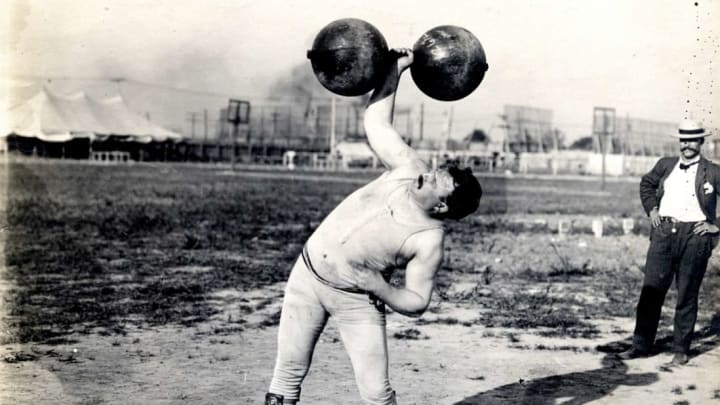5 Wacky Moments from Olympic Games Past
By Ethan Trex

The history of the Olympic Games is peppered with unexpected—and sometimes inexplicable—events. Here are a few of the wackiest from Olympiads past.
1. The Olympic marathon has seen its share of shenanigans.
For the first modern Olympics, which took place in Athens, Greece, in 1896, organizers included a 40,000-meter (24.85-mile) run. The event paid tribute to the legendary Pheidippides's supposed jog from Marathon to Athens in 490 BCE. Seventeen runners gave the first marathon a try, and Greek athlete Spyridon Louis won the gold with a finish in two hours, 58 minutes, and 50 seconds.
Subsequent marathons didn't go off quite as smoothly. In the 1904 Olympic Games in St. Louis, Missouri, Cuban runner Félix Carvajal saved up enough money to travel to the Games. But on a layover in New Orleans, he gambled away the rest of his savings and had to hitchhike to St. Louis. He showed up for the race wearing dress shoes and long pants. A fellow competitor cut the legs off Carvajal's trousers. He finished fourth overall.
Carvajal’s odyssey wasn't even the strangest of the 1904 marathon, though. American Fred Lorz zipped across the finish line with a winning time of three hours and 13 minutes. Just as presidential daughter Alice Roosevelt was about to give him his medal, it was revealed that he had actually ridden in a car for miles nine through 21 and then resumed running. He was disqualified, but the very next year, Lorz legitimately won the Boston marathon in a scorching two hours, 38 minutes, and 25 seconds.
Then there's the special sauce employed by the real marathon winner of the 1904 Olympics, English-born American Thomas Hicks. In the days before Gatorade, Hicks's coaches revived him with a mix of strychnine and brandy.
For the 1906 Intercalated Games in Athens, Canadian marathoner William Sherring didn’t have enough money to get to Greece. He decided to bet his small cash reserve of $75 on a horse named Cicely, who won at 6:1 odds. Sherring made it to Athens and won the gold in two hours and 51 minutes. He received a statue of Athena and a live lamb as prizes.
2. Some Olympic medal announcements were extremely brief.
Canadian George Goulding may have won the gold in the 10,000-meter walk in the 1912 Stockholm Games, but he wasn't about to waste any money on extra words when he wired the news home. The telegram he sent his wife read "Won—George."
3. Before the Dream Team, Olympic basketball could be a nightmare.
Basketball made its Olympic debut in 1936 in Berlin, but German organizers didn’t bother with building actual basketball courts. The event was played outdoors on clay-and-sand lawn tennis courts. Dribbling a basketball on clay and sand is never easy, but it became even tougher when the gold medal game between Canada and the United States coincided with a thunderstorm. Scoring became nearly impossible. Team USA won with a 19-8 victory.
At the 1952 Olympics in Helsinki, the Uruguayan basketball team took home the gold for bad behavior. The team fouled so many times against France that, by the end of the game, only three players were left on the court. After France scored a game-winning layup, the Uruguayans attacked the American referee. They sent three Soviet players to the first-aid station in their game against the U.S.S.R. And in the match with Argentina—in which 66 personal fouls were called, 42 of them against Argentina—there was a near-riot before it was broken up by a large security contingent brought in because of the earlier referee attack.
4. Alcohol was considered a performance-enhancing drug.
In 1968 the Swedish team appeared to have won the bronze in modern pentathlon until Hans-Gunnar Liljenwall failed a drug test—for alcohol. It was common for modern pentathletes to have a tipple to calm their nerves before the shooting competition, but Liljenwall hit the bottle a bit too hard. He became the first person to ever receive a drug disqualification from the Olympics after his blood alcohol content came in above the legal limit.
5. Winners didn’t necessarily know they had won at the Olympics.
The 1900 Olympics were held in conjunction with the World’s Fair in Paris, which took the lead in organizing the event. This meant that there were Olympic events, championship events, professional events, and more happening at the same time in the same place—and rarely called "Olympic" at the time. Since then, Olympic historians have struggled to figure out which events were "Olympic" and which weren’t.
In one example, Margaret Abbott had no clue that when she decided to compete in a nine-hole golf tournament outside Paris—which she won—she was competing in an Olympic game. Decades after Abbott’s death in 1955, University of Florida professor Paula Welch discovered that not only was Abbott an Olympic champion, she was America’s first female Olympic champion.
On the other hand, in the 1980s, historians Max and Reet Howell argued that Australian Donald Mackintosh won a gold in the 1900 Games in live-pigeon shooting, which is what it sounds like. The IOC acknowledged Mackintosh as winning “a gold medal in game shooting” in 1988. But by 2012, the IOC had stripped Mackintosh of his gold. Even today, the Australian Olympic Committee is inconsistent in considering Mackintosh an Olympic champion. Fortunately, live pigeon shooting has been swept into the dustbin of history.